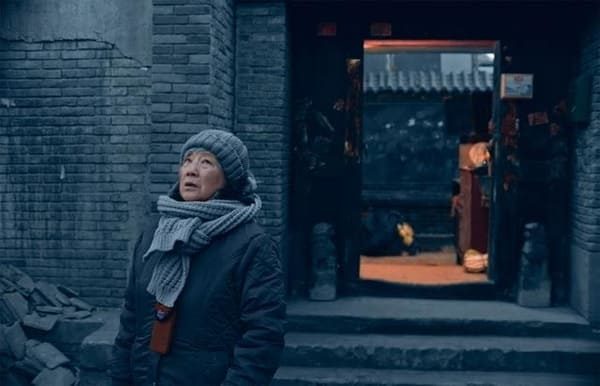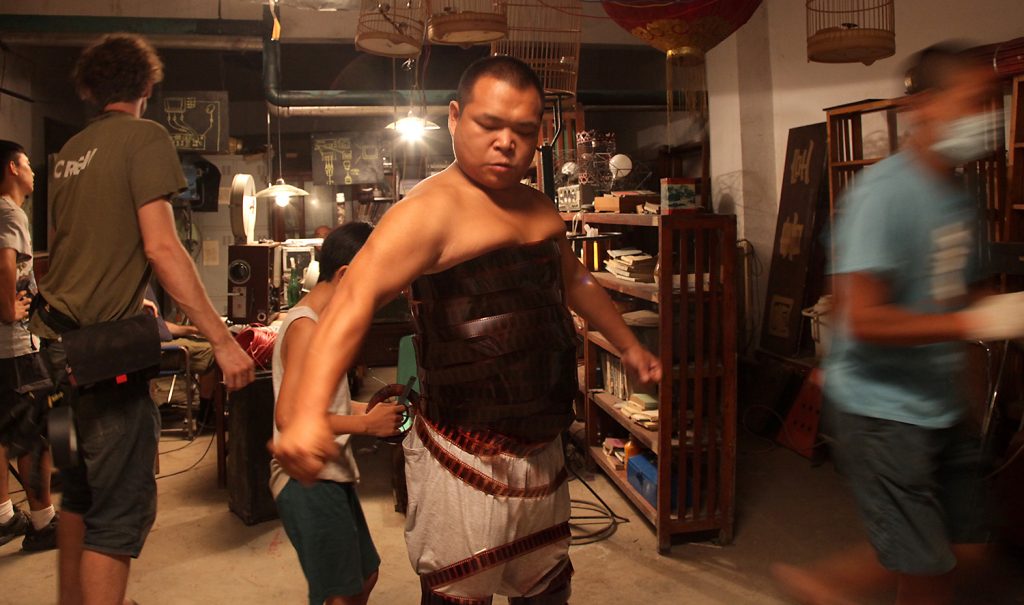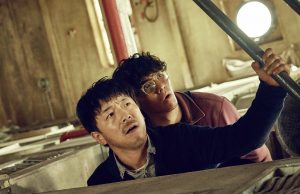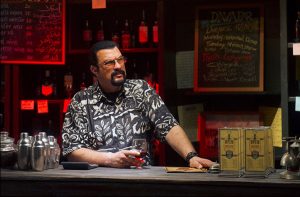Every day while CFI’s Hollywood readers take in the business of the Chinese film industry, the actual movies can sometimes seem exotic or remote. But in major US cities, mainstream Chinese films are increasingly available: thanks to Wanda’s purchase of AMC and distributors like China Lion, they get American theatrical releases practically simultaneous to their premieres at home. Though they receive virtually no publicity outside the non-Chinese community, these films are more than worth seeking out by anyone serious about engaging the Chinese industry, understanding the Chinese sensibility and familiarizing themselves with China’s talent pool. Periodically, CFI will review and point readers in the direction of noteworthy US releases of contemporary commercial and independent Chinese titles.
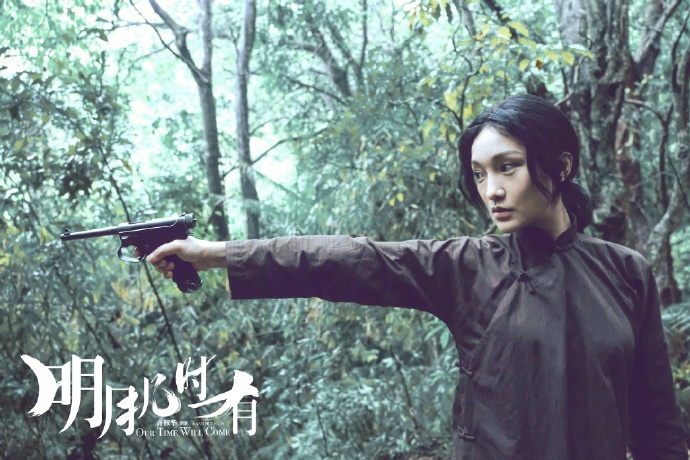
‘Our Time Will Come.’ Photo: China Lion/Weibo.
Our Time Will Come (2017)
Grade: A
Director Ann Hui’s World War II Hong Kong resistance drama Our Time Will Come, now playing in select theaters in North America, works from an enviably clean script by Ho Kei Ping to tell the complex story of the fight against the invading Japanese from 1941-45.
The spirit of young people from all walks of Hong Kong life willing to pull together to help Chinese intellectuals and artists flee the draconian Japanese military police to unoccupied territory on the mainland, is well-captured in the real life character of Fang Lan (Hung Sau-Fong in Cantonese), beautifully played by mainland actress Zhou Xun.
“Miss Fong,” as the schoolteacher-turned-resistance fighter is known, is in her mid-twenties and living with her mother, who rents rooms in their modest home to make ends meet at a time of food rationing and rampant abuse of the locals by the soldiers of the Imperial Army.
When the poet Mao Dun and his wife must be smuggled out of Hong Kong on a riverboat, Fong is swept up by history, and, over the course of the beautifully shot film, swept away by her admiration for Liu Heizai (a.k.a. ‘Blackie’ Lau), a fearless and handsome rural peasant rebel played with great spirit and charm by Eddie Peng (Duckweed). From different worlds, their self-sacrifice against a common Japanese enemy is the bond that surely appealed to the censors in Beijing, who would have had to approve the film for release in China.
Fong leaves her aging mother to join the underground fight. ”What difference can you make?” asks her mother, played gutsily by Nina Paw Hee-ching, to which Fong replies: “Ma, if everyone thought this way, there’d be no victory.”
Symbolically, at least for Hong Kong audiences who’ve just lived through the Umbrella movement in support of democracy in the face of encroaching Communist rule, her mother sends her off to the fight with an umbrella and a gold ring.
Our Time Will Come briefly gained notoriety on the mainland in June when it was bumped from the opening night slot at the Shanghai International Film Festival without explanation. That the film’s story of common people standing up to authority comes amidst increasing tensions in the Hong Kong Special Administrative Region cannot be lost on Chinese audiences anywhere.
The film’s release in China, on July 1, coincided with the 20th anniversary of the handover of Hong Kong to China after 151 years of British colonial domination. That Hong Kong people protested the arrival last week of China’s president Xi Jinping in their city just as the film was released, would also have been on the lips of moviegoers.
It is, of course, always safe in a Chinese movie to demonize the Japanese oppressors, and Hui does a good job of painting the fraught relationship between Fong’s sometime boyfriend Li Jinrong (Lee Gam-wing in Cantonese) and a Japanese colonel in charge of intelligence gathering. The sharp-dressed men of discipline exchange thoughts about Chinese poetry over barbecue, the oppressor showing respect for the culture of his captor—to a point.
When it is discovered that Li, played with subtlety by Wallace Huo, is, like so many of the Hong Kong people and Chinese working for the Kempeitai (the military police arm of the Imperial Army), also leaking information to the guerrilla resistance, the Japanese colonel slashes him with his sword. And yet Li doesn’t falter:
“There are many things you’ll never understand,” Li tells the colonel, dismissing his authority. “And anyway, you won’t last long here.”
While Li meets a dark fate in spite of his defiance, Blackie Lau and Miss Fong slip into the night of history, in retreat but undefeated. They tried and failed to save her mother from the grips of the Japanese—parting sweetly by the river’s edge, in mutual admiration and bravery, voicing the film’s refrain, “See you after the victory.”
When the music comes up at the end of the film, the river’s edge fades to a scene of modern day Victoria Harbor where five old men are seen getting off a ferry. One of them, “Little Ben,” is a real life witness to the events portrayed in the film.
Throughout the movie, which runs two hours and ten minutes, we’ve seen Little Ben occasionally, in black and white, documentary-style interviews. These chats (seemingly conducted by Hui) are intercut with the dramatic scenes from the 1940s, offering viewers an old man’s tearful reminiscences of his former schoolteacher Miss Fong.
Little Ben was a child resistance fighter, a messenger in the 1940s, whose voice, in 2017, director Hui brings to bear on her dramatization of history. In doing so, she gives Hong Kong people a wake up call, a reminder that still alive among them are people willing to fight for what’s right against the forces of oppression. And she gets away with it because the oppressors, on screen, anyway, are Japanese.
WHAT DOES THE GRADE MEAN?
Here are some recent & modern-era vintage Chinese and Hong Kong films for comparison
- A+
- PLATFORM (2000, dir Jia Zhangke)
- THE WORLD (2004, dir. Jia Zhangke)
- DRUNKEN MASTER 2 (1994, dir. Lau Kar Leung & Jackie Chan)
- KUNG FU HUSTLE (2004, dir. Stephen Chow)
- A
- LET THE BULLETS FLY (2010, dir Jiang Wen)
- THE MERMAID (2016, dir. Stephen Chow)
- A TOUCH OF SIN (2013, dir. Jia Zhangke)
- STILL LIFE (2006, dir. Jia Zhangke)
- MOUNTAINS MAY DEPART (2015, dir. Jia Zhangke)
- LITTLE BIG SOLDIER (2010, dir. Ding Sheng)
- EXTRAORDINARY MISSION (2017, dir. Alan Mak & Anthony Pun)
- MR SIX (2015, dir. Guan Hu)
- A WORLD WITHOUT THIEVES (2004, dir. Feng Xiaogang)
- SUZHOU RIVER (1999, dir. Lou Ye)
- HOUSE OF FLYING DAGGERS (2004, dir Zhang Yimou)
- RAISE THE RED LANTERN (1991, dir. Zhang Yimou)
- A-
- DUCKWEED (2017, dir. Han Han)
- I BELONGED TO YOU (2016, dir. Zhang Yibai)
- B+
- THE GREAT WALL (2016, dir. Zhang Yimou)
- OLD STONE (2016, dir. Johnny Ma)
- CRAZY STONE (2006, dir. Ning Hao)
- GO, LALA GO (2010, dir. Xu Jinglei)
- B
- KUNG FU YOGA (2017, dir. Stanley Tong)
- RAILROAD TIGERS (2016, dir. Ding Sheng)
- THE WASTED TIMES (2016, dir. Cheng Er)
- CHONGQING HOT POT (2016, dir. Yang Qing)
- MONSTER HUNT (2015, dir. Raman Hui)
- B-
- JOURNEY TO THE WEST: THE DEMONS STRIKE BACK (2017, dir. Tsui Hark)
- SOME LIKE IT HOT (2017, dir. Song Xiaofei & Dong Xu)
- BORN IN CHINA (2016, dir. Lu Chuan)
- D-
- TINY TIMES (2013, dir. Guo Jingming)


